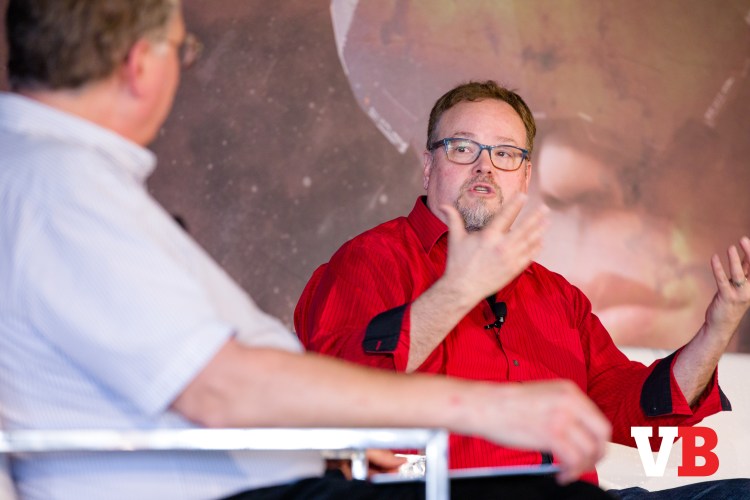Computer science doesn’t just solve technical issues when it comes to making games. This is one of the many takeaways from the discussion between Improbable chief creative officer Bill Roper and StoryPHORCE CEO and founder Steve Peterson on the future of game design. The two riffed on how persistent online worlds could look very different in the future, how multiplayer and single-player games may soon converge, and the rise of what Peterson calls “massively personal online role-playing” games.
In a fireside chat at the GamesBeat Summit in Mill Valley, California, the two industry vets shared their perspectives on what the next step could be for games with huge, complex worlds. They both have a long history with multiplayer games. Roper got his start producing Warcraft: Orcs & Humans and went on to produce and design several classic Blizzard Entertainment games like StarCraft, Warcraft II, and Diablo. Peterson began as a pen-and-paper game designer, creating the superhero RPG Champions. He went to work at Electronic Arts, and Champions has been reimagined as a comic as well as a massively multiplayer online RPG — developed by Cryptic Studios, where Roper was the chief creative officer.
Roper’s current company, Improbable, is focused on alleviating MMO’s computational burden so that their enormous worlds can run smoother and quicker by distributing their processes on the cloud. But it’s not just solving solely technical issues — these same constraints affect the way designers approach games. Roper says that designers are so used to having to “think reductively” because they’re always scrimping and saving on processing power. Once they no longer have to think about that, it could open new possibilities.
He describes a scenario of “meaningful cross-platform play” that would be possible: Players on different consoles could have entirely different experiences in the same game world while still playing together. On PC and console, they might be playing as ground troops in a standard first-person shooter. And teammates on mobile could control drones in the world with an entirely different perspective.
Designers could blend genres and — real-time strategy and first-person shooter, for instance — and enable players to experience the same game in personalized ways. And this could broaden the audience for games as people will be able to play the way they want.
“People who don’t want to even be involved with combat, what they want to do is be a medic but not what we think of as a medic in a first-person shooter now,” said Roper. “The more medics you have come in can actually then build structures together to heal more people from the front. You’re doing front-line medicine, you’re actually working together with other like-minded people to play those things.”
Expanding the technical constraints of games could also result in vast, persistent worlds where players could experience complex story arcs. They could opt to play as an adventurer at first but then decide to retire as a baker in a fantasy world. This could lead to emergent epic stories — for instance, they might be brought in to cater the king’s banquet, only for enemies to attack. Luckily for all in attendance, the baker used to be a legendary warrior.
“What I like to call this concept is ‘massively personal online role-playing,’ where you’re getting more of what your’e interested in because you’re helping to create it,” said Peterson. “And it’s persistent. You’re dealing with people who are your friends or becoming your friends. But the world would have a richness just from persisting for a while.”
What’s next, Roper says, is to combine the “depth of traditional console and PC games” with the “accessibility and immediacy of mobile games.” People will be able to have a “multiversal self” by interacting with persistent worlds that combine deep gameplay that’s personalized as well as social.
“I think there was a split that occurred in gaming, where one part of our industry went towards massively multiplayer games, into online gaming, and what those experiences could be or just being even online and competitive gaming,” said Roper. “And then this other side went to what I always like to think of as ‘massively single-player games’ where you have these incredibly rich worlds, these very, very deep experiences, where you as a character matter immensely to what happens in that world. And we’re at a point now where these two concepts should join back up.”

